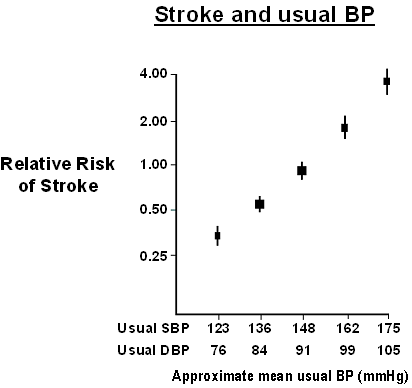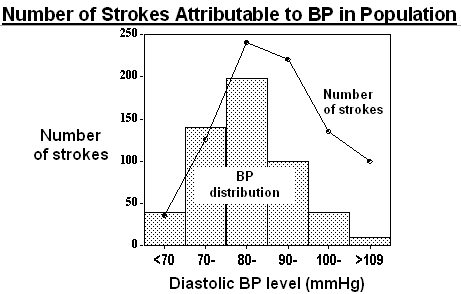前言
什么是高血压?
血压高于140/90mmHg就称为高血压,在此基础上,研究证实降低血压有助于减少脑卒中和心脏病发作风险。
高血压发病的潜在因素
研究证实肥胖加之缺乏运动是导致高血压的关键因素。不过,更多研究证实盐与高血压发病有关,特别是随年龄增长而出现的血压升高,而钾摄入量多少却与其有相反效果,而且在特定条件下,钾的摄入可部分抵消高盐饮食所带来的影响(1)。从流行病学角度来看,过量饮酒也与血压有关(2),但这种影响似乎是一过性的,而且对于过量饮酒是否会导致血压持续升高尚存争议。同样也对其他饮食因素(如钙、镁、脂肪、蛋白质的摄入)进行了研究,但目前为止尚未获得统一的结果。
在"正常"范围内降低血压的益处
流行病学研究显示,从115mmHg的收缩压开始,整个血压正常范围内都存在风险,而80%以上的成年人都高于该水平(3,4)。事实上,绝大部分脑卒中和心脏病发作都归因于正常偏高的血压,虽然这种风险比高血压人群要低,但由于这类人群的数量远大于高血压人群,因此这类人群出现脑卒中或心脏病发作的总数也就远高于高血压人群。(5) (Fig 2).

Figure 1. Relative risk of stroke in relation to systolic and diastolic blood pressure. (From Ref. 4).
任何可以降低大众血压的干预手段(即使只是降低稍许),在预防脑卒中和心脏病发作方面都会带来巨大益处,而且若其能减缓血压随年龄升高的速度,则时间越长,益处越大。很多年前Geoffrey Rose指出,全人类的收缩压即使只下降2mmHg,其带来的效益也大于目前所有降压治疗方法的整体效果。另外,针对心血管疾病高风险人群的最新研究表明,即便只是将血压控制在“正常”(平均)水平也会带来巨大效果。(6, 7) .

Figure 2. Absolute number of strokes in 405000 individuals in seven prospective observational studies by baseline diastolic blood pressure. Approximately three-quarters of all strokes attributable to blood pressure occurred among individuals classified as "normotensive". (Redrawn from Ref. 5).
盐与血压间关系的研究试验
对于盐与血压间的关系进行了大量研究,所有研究都支 持一种观点,即盐是人体血压升高的一个关键因素。这类研究远远多于对其他生活方式因素的研究,如体重上升、水果和蔬菜摄入量低、缺乏运动等。盐与血压的关系跟吸烟与癌症和心脏疾病的关系一样紧密。
. Animal Studies |
. Intervention Studies |
. Genetic Studies |
. Population Studies |
. Epidemiological Studies |
. Mortality Studies |
. Migration Studies |
. Treatment Studies |
参考文献
(1) MacGregor G A. Nutrition and blood pressure. Nutr Metab Cardiovasc Dis. 1999;9:6-15.
(5) MacMahon S. Blood pressure and the prevention of stroke. J Hypertens Suppl. 1996;14:S39-46.